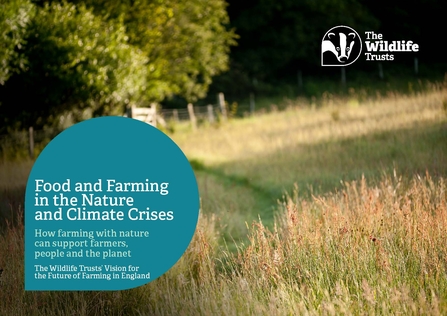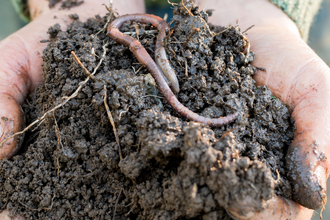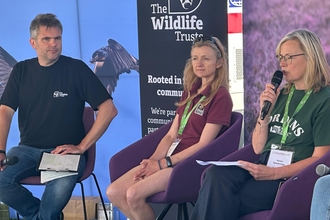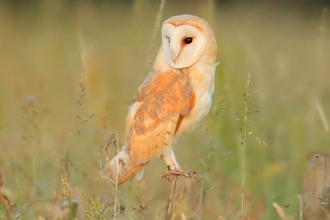Groundswell Festival is a hands-on, practical event all about regenerative farming - a way to prioritise soil health whilst producing food. It's the perfect place to learn from experts about techniques like no-till planting, cover cropping and bringing livestock back to arable fields to supercharge soil health.
Groundswell took place on 2nd - 3rd July 2025 at Lannock Manor Farm, and was packed with talks, demonstrations and discussions to help anyone interested in food growing to make smarter, more sustainable farming choices.
The Wildlife Trusts at Groundswell!
We were delighted to host the brand new 'Farming with Nature' stage at Groundswell! With panel events and lively discussions, our tent unpicked the changing farming policy environment and the data behind nature-friendly farming.
Explore our sessions below.
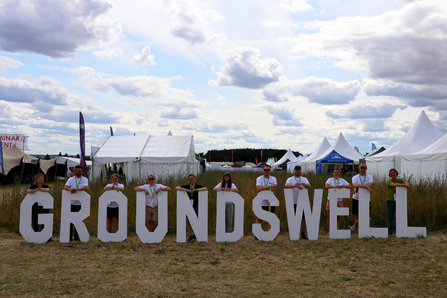
Farming with Nature tent
Wednesday 2nd July
11.15am-12pm - Farming smarter: the data on nature friendly farming
Are the regenerative practices that not only boost agricultural yields but combat climate change and recover wildlife? The session explored the current evidence and ongoing research to improve our understanding of how regenerative agriculture can support both UK farm businesses and wildlife.
1.10pm-1.50pm - Lowland peat solutions: rethinking farming on lowland peat
Lowland peat soils are precious yet they are severely degraded, leading to soil and nature loss and greenhouse gas emissions. This session explored the tools we have to rethink agriculture on lowland peat with speakers (including farmers) who are directly involved with projects on the ground.
3.10pm-3.50pm - Are you beaver-ready? How beavers can boost your farm resilience
Panellists discussed how beavers' return can promote the resilience of farm business, from securing management payments to supporting drought resilience, to delivering nature recovery with its related tourism opportunities.
5pm-5.45pm - How can we cultivate the skills needed for regenerative farming?
This panel, with voices from policy, academia and practice, explored how to build capacity for nature recovery, focusing not on the what, but the how.
Thursday 3rd July
9am-9.45am - Farm habitats and beneficial insects discovery walk
Five experienced entomologists guided attendees around the onsite farm, immersing them in the fascinating world of insects, and explaining how their interactions benefit crops, soils and the surrounding environment.
10.15am-11am - Beneficial insect monitoring and identification for farmers
This session explored how beneficial insects like carabid beetles, pollinators and decomposters support crop health and soil.
12pm-12.50pm - Nutrient circularity for nature restoration
Nitrogen is vital for farming, yet arable systems lose most of it, wasting resources and harming nature. This session explored how improving nutrient use at farm, catchment and national levels can cut pollution and boost farm resilience.
2.10pm-2.50pm - The case for farming with nature in a changing policy environment
This panel discussed focused on the business case for regenerative farming following the pause to the Sustainable Farming Incentive in England, and how to manage the transition to nature-friendly practices at a time of high policy uncertainty.
4pm-4.45pm - Common ground: how farmers and conservationists can work together
This session looked at the real lived experiences of farmers and conservationists who have worked together for the benefit of the natural world. Farmers shared the highs and lows of their journeys to sustainable farming with advice and support from wildlife advisors, and the role that nature has played in the development of their farm businesses.
Other Wildlife Trust sessions
Wednesday 2nd July
9.30am - Celebrating 10 years of the Jordans Farm Partnership (LEAF Stand)
This year marks a major milestone - a decade of the Jordans Farm Partnership. We celebrated 10 years of working together to farm for nature. Learn more about our Jordans Partnership in our short video! Let’s celebrate the journey and look ahead to the next 10 years of farming with nature.
Thursday 3rd July
11am-11.55am - How shifting baselines cloud our view of what's possible (The Workshop Tent)
The Wildlife Trusts' Vicki Hird joined this panel to discuss how, with each generation that passes, our understanding of the abundance of nature is muted. The session explored shifting baseline theory, and highlighted the role farmers, policymakers and technology has in shaping baselining tools to break this cycle.
The Wildlife Trusts' 25 Year Farming Vision
The Wildlife Trusts have launched our 25 Year Vision for Farming. This vision sets out a blueprint for delivering healthy diets, nature recovery and climate-resilient farm and food businesses long into the future.
Transformation of the food and farming system is more vital than ever as farmers are continuing to face a huge degree of uncertainty, battling the ever-increasing impacts of a changing climate and volatile markets.


